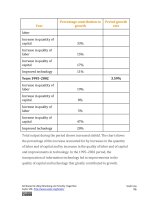Authors libby rittenberg 802
Bạn đang xem bản rút gọn của tài liệu. Xem và tải ngay bản đầy đủ của tài liệu tại đây (291.32 KB, 1 trang )
voters wield considerable influence, trying to fix rising gasoline prices can
turn into a task from which a wise politician does not shrink.
By the summer of 2008, crude oil was selling for more than $140 per
barrel. Gasoline prices in the United States were flirting with the $4 mark.
There were perfectly good market reasons for the run-up in prices. World
oil demand has been rising each year, with China and India two of the
primary sources of increased demand. The world’s ability to produce oil is
limited and tensions in the Middle East were also adding doubts about
getting those supplies to market. Ability to produce gasoline is limited as
well. The United States has not built a new oil refinery in more than 30
years.
But, when oil prices rise, economic explanations seldom carry much
political clout. Predictably, the public demands a response from its political
leaders—and gets it.
Largely Democratic Congressional proposals in 2008 included such ideas
as: a bill to classify the Organization of Petroleum Exporting Countries
(OPEC) as an illegal monopoly in violation of U.S. antitrust laws, taxing
“excessive” profits of oil companies, investigating possible price gouging,
and banning speculative trading in oil futures. With an overwhelming
majority on both sides of the aisle, Congress passed a bill to suspend
adding oil to the Strategic Petroleum Reserve—a 727 million gallon
underground reserve designed for use in national emergencies. President
Bush in 2008 was against this move, though in 2006, when gas prices were
approaching $3 a gallon, he supported a similar move. Whether or not to
offer a “tax holiday” on the 18.4 cents per gallon federal gas tax stymied
some politicians during the 2008 presidential campaign because Hillary
Clinton, a Democrat, and John McCain, a Republican, supported it, while
Attributed to Libby Rittenberg and Timothy Tregarthen
Saylor URL: />
Saylor.org
802









